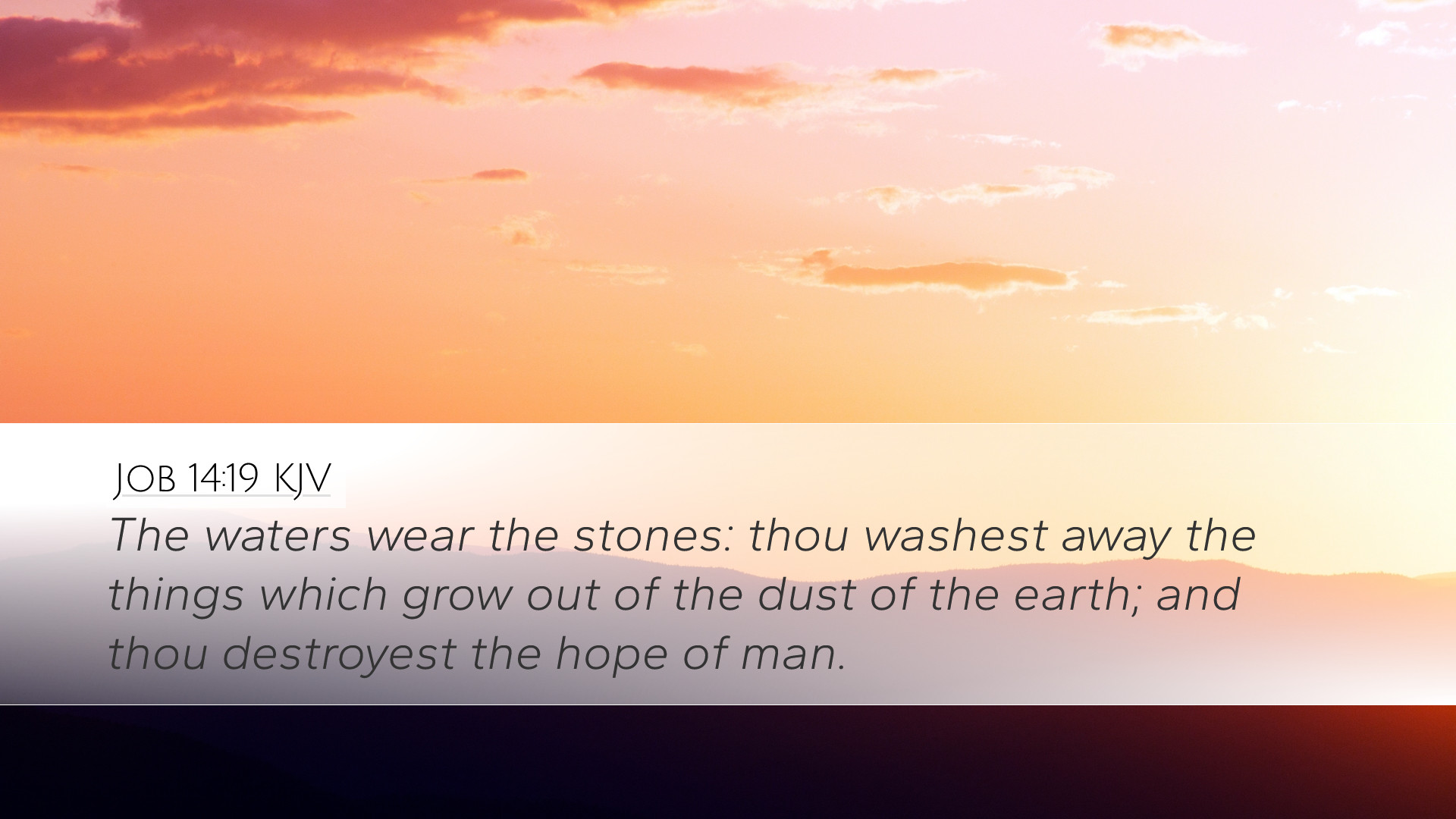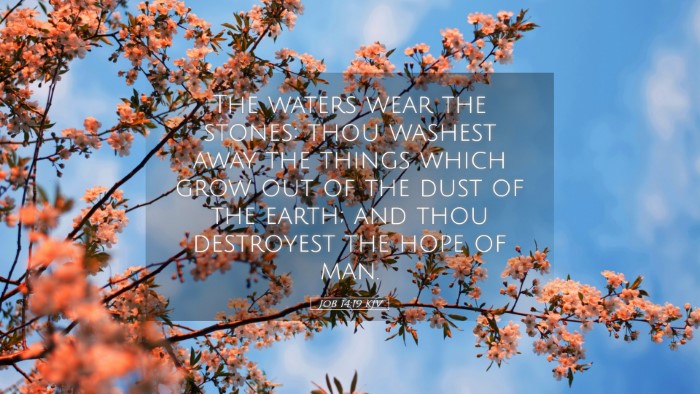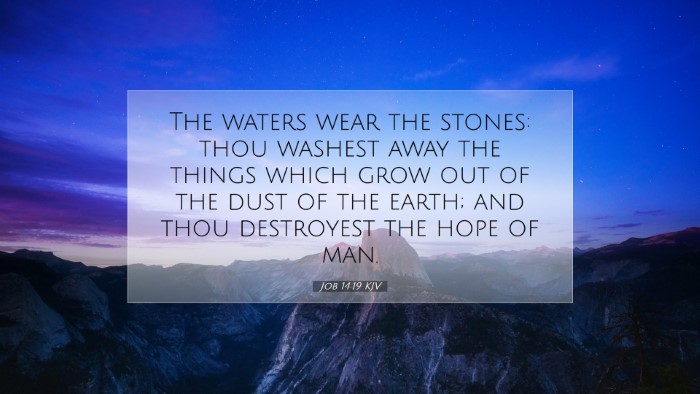Old Testament
Genesis Exodus Leviticus Numbers Deuteronomy Joshua Judges Ruth 1 Samuel 2 Samuel 1 Kings 2 Kings 1 Chronicles 2 Chronicles Ezra Nehemiah Esther Job Psalms Proverbs Ecclesiastes Song of Solomon Isaiah Jeremiah Lamentations Ezekiel Daniel Hosea Joel Amos Obadiah Jonah Micah Nahum Habakkuk Zephaniah Haggai Zechariah MalachiJob 14:19
Job 14:19 KJV
The waters wear the stones: thou washest away the things which grow out of the dust of the earth; and thou destroyest the hope of man.
Job 14:19 Bible Commentary
Commentary on Job 14:19
Verse Context: Job 14:19 states, "The waters wear away the stones: thou washest away the things which grow out of the dust of the earth; and thou destroyest the hope of man." This verse comes from Job’s meditation on human frailty and the seeming futility of life. Job, amidst his suffering, reflects on the transient nature of human existence in contrast to the enduring elements of nature.
Summary of Insights
This verse encapsulates a poignant theme within the Book of Job: the contrast between divine sovereignty and human vulnerability. Through a synthesis of Matthew Henry, Albert Barnes, and Adam Clarke’s commentaries, we derive deeper understanding on how this verse speaks to both the physical and spiritual realities of life and death.
1. The Metaphor of Erosion
Matthew Henry’s Insight: Henry likens the waters that "wear away the stones" to the gradual but inevitable process of decay and destruction that characterizes human life. Just as water can erode even the hardest rock over time, Job suggests that life’s trials and tribulations can erode human strength and hope. This serves as a reminder of our mortality and helplessness in the face of natural processes.
Albert Barnes on the Detachment of Hope: Barnes emphasizes that Job’s reference to water washing away the dust represents a spiritual truth. Just as water can cleanse and remove, so the experiences of life can wash away human hopes. Human aspirations are fragile, easily swept away by the tides of circumstance. This metaphor urges readers to recognize the impermanence of earthly attachments and the need to anchor hope in the divine.
2. The Cycle of Life and Death
Adam Clarke’s Perspective: Clarke interprets Job's lament as a meditation on the cycle of life and death. He notes that death is portrayed not as an end but a transformation, much like the dust of the earth returning to the ground. This reflects a biblical anthropology that acknowledges the physical decay of the body while hinting at the hope of resurrection—a theme paralleled in New Testament writings.
3. Human Vulnerability
Combining ideas from the commentaries, we see a profound acknowledgment of human vulnerability. All human existence bears the marks of life’s weariness, much like stones gradually worn down by persistent water. The inevitability of suffering and death is central to Job’s discourse here, a truth that resonates universally with the human experience.
Reflective Points for Pastoral Applications:
- Encouragement in Weakness: Pastors may use this passage to encourage congregants who feel overwhelmed by life’s challenges. Reminding them that their trials are not devoid of purpose can bring comfort.
- Hope in Despair: The verse serves as a reminder to place hope in God’s promises rather than temporal success or security. It invites believers to look beyond the current struggles to the eternal hope found in faith.
- Need for Resurrection Hope: Emphasizing the role of Christ’s resurrection can connect the themes of Job with New Testament theology, reassuring believers that life continues beyond physical death.
4. Theological Reflections
The Problem of Suffering: Job’s reflections raise essential questions about the nature of suffering and divine justice. The suffering presented in the text is not simply punitive but also part of a greater mystery that invites deeper faith and understanding. The commentaries suggest that suffering can purify and prepare individuals for greater glory, echoing themes seen in Romans 8:18-25 where present sufferings are attributed a divine purpose.
Human Mortality and Divine Sovereignty: The tension between human frailty and divine power underscores the wisdom of submission to God’s will. Job recognizes that ultimate control resides with God, even as he wrestles with his pain. This acknowledgment is essential for believers today who seek to find meaning in their trials.
5. Conclusion
The commentary on Job 14:19 from the perspectives of Matthew Henry, Albert Barnes, and Adam Clarke encapsulates a timeless message about the human condition. By reflecting on the imagery of erosion and the transitory nature of life, this verse invites both sorrowful contemplation and hopeful faith. As life wears away our earthly hopes, we are called to find strength and hope in the everlasting promises of God.
In light of Job’s reflections, ministers, scholars, and students may find this passage to be a rich ground for theology, pastoral care, and personal reflection as they navigate the complexities of suffering, hope, and divine sovereignty.


